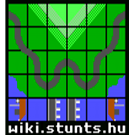OWOOT: Difference between revisions
m Add link to GAR page |
|||
| Line 32: | Line 32: | ||
'''TWOOT''' refers to rules in which two wheels, rather than just one, must stay on or over the track. | '''TWOOT''' refers to rules in which two wheels, rather than just one, must stay on or over the track. | ||
'''GAR''', short for "Gentlemen's Agreement Rules", refers to the combination of strict OWOOT and [[NoRH]], as established by [[Marco]] and featured in the unofficial GAR scoreboard added by ZakStunts in the 2016 season. | '''[[GAR]]''', short for "Gentlemen's Agreement Rules", refers to the combination of strict OWOOT and [[NoRH]], as established by [[Marco]] and featured in the unofficial GAR scoreboard added by ZakStunts in the 2016 season. | ||
Occasionally (e.g. when discussing [[live racing]]) a looser concept of "following the road" or "following the yellow line" may be used; the intended meaning typically being a more lenient variant of Free OWOOT, in which minor faults like leaving momentarily the road when driving through a [[chicane]] might be ignored. | Occasionally (e.g. when discussing [[live racing]]) a looser concept of "following the road" or "following the yellow line" may be used; the intended meaning typically being a more lenient variant of Free OWOOT, in which minor faults like leaving momentarily the road when driving through a [[chicane]] might be ignored. | ||
[[Category:Competition]] | [[Category:Competition]] | ||
Revision as of 22:55, 13 February 2019
OWOOT stands for "One wheel on/over track", and is a rule for certain competitions. The rule means that you have to have at least one wheel on or over the track at all times. This means you cannot leave the road and make shortcuts, which makes for a totally different, cleaner and more perfectionistic races. The expression and the rule were first developed by Ruepel and Pershing II who made the ISA competition with this rule in 2002.
There is one general exception to the OWOOT rule: the grass square in the middle of a jump. Additionaly, there are a few variations on how the OWOOT rule gets implemented in competitions. The variants may be classified in "strict" or "free" OWOOT rules.
Strict OWOOT
Strict OWOOT rule (often refered to as IRC rules) means no shorcuts at all, meaning that racers must drive all stunt elements completely and "follow the yellow dots" in loops and corkscrews.
List of Strict OWOOT competitions
- IRC competition
- WSC competition
- The Southern Cross Stunts Trophy (two wheels must be on or over the track)
- Copa Stunts (two wheels must be on or over the track)
- Race For Immortality event
- Race For Kicks tournament
Free OWOOT
Free OWOOT rule (often refered to as ISA rules) means that you can cut some stunt elements (like driving only the right side of the corkscrew left/right), or jump over them.
List of Free OWOOT competitions
- ISA competition
- IMSA Cup (jump over corks up/down and left/right allowed, but no loopcut allowed)
- WRC Stunts (only cuts done by jumping over track elements with OWOOT are allowed)
- HOTU Stunts competition in 2003 (all cuts allowed as long as you stayed over the road)
- JACStunts (two wheels must be on or over the track, and no elements may be skipped except by flying over up/down corks)
Other variants
TWOOT refers to rules in which two wheels, rather than just one, must stay on or over the track.
GAR, short for "Gentlemen's Agreement Rules", refers to the combination of strict OWOOT and NoRH, as established by Marco and featured in the unofficial GAR scoreboard added by ZakStunts in the 2016 season.
Occasionally (e.g. when discussing live racing) a looser concept of "following the road" or "following the yellow line" may be used; the intended meaning typically being a more lenient variant of Free OWOOT, in which minor faults like leaving momentarily the road when driving through a chicane might be ignored.
